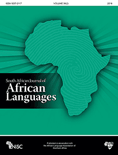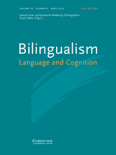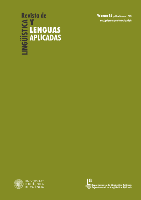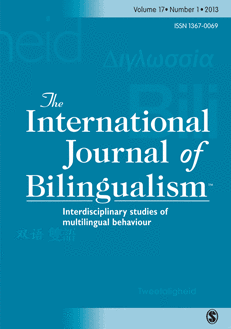
Heritage Language Journal
Scope & Guideline
Championing the Study of Multicultural Linguistics
Introduction
Aims and Scopes
- Heritage Language Acquisition:
Investigates the processes and challenges specific to heritage language learners, emphasizing the interplay between language proficiency, exposure, and sociocultural factors. - Bilingualism and Code-Switching:
Explores the dynamics of bilingual language use, including code-switching patterns and their implications for identity and communication among heritage speakers. - Cultural and Identity Aspects:
Examines how heritage languages contribute to identity formation and cultural maintenance within communities, focusing on the voices and experiences of heritage learners. - Pedagogical Approaches:
Focuses on innovative teaching methodologies and curriculum development that support heritage language learners, highlighting critical language awareness and community-based education. - Linguistic Variation and Change:
Studies the unique linguistic features and variations found within heritage languages, including phonetic, morphosyntactic, and pragmatic dimensions.
Trending and Emerging
- Digital Storytelling and Technology Integration:
An increasing focus on digital storytelling as a pedagogical tool highlights the role of technology in amplifying heritage learners' voices and identities, making language learning more engaging and relevant. - Critical Perspectives on Bilingualism:
Research that adopts critical frameworks to analyze bilingual experiences and identity development is gaining traction, emphasizing the socio-political dimensions of language use and education. - Community-Based Language Education:
There is a notable trend towards community-oriented approaches in heritage language education, recognizing the importance of local contexts and community engagement in promoting language vitality. - Interdisciplinary Approaches to Heritage Language Research:
Emerging themes reflect a growing interdisciplinary approach, integrating insights from psycholinguistics, sociolinguistics, and education to provide a more comprehensive understanding of heritage language phenomena. - Focus on Pragmatic Competence:
Recent studies are increasingly examining pragmatic knowledge and interactional competence among heritage speakers, underscoring the importance of social context in language use.
Declining or Waning
- Traditional Language Maintenance Strategies:
There appears to be a reduced emphasis on conventional language maintenance strategies, as recent research increasingly explores more dynamic, community-based approaches that reflect the complexities of modern bilingual environments. - Monolingual Perspectives on Heritage Languages:
The focus on monolingual frameworks for understanding heritage language acquisition is waning, as the field embraces more nuanced, bilingual and multilingual perspectives that recognize the interplay of multiple languages. - Static Models of Language Proficiency:
Research that relies on static models of language proficiency is becoming less common, with a shift towards understanding proficiency as a dynamic construct influenced by various social and contextual factors.
Similar Journals

NEUPHILOLOGISCHE MITTEILUNGEN
Unraveling Linguistic Trends from a European PerspectiveNEUPHILOLOGISCHE MITTEILUNGEN, published by the esteemed Modern Language Society, stands as a significant contribution to the domain of Language and Linguistics. With a history dating back to 1971, this journal has consistently provided an academic platform for researchers and scholars, navigating through the intricacies of philology and linguistic studies. Although it is indexed in Scopus with rankings reflecting its position in the Arts and Humanities and Social Sciences categories, it currently does not offer Open Access, which may require interested parties to seek institutional access for its wealth of content. The journal has experienced periods of coverage discontinuation in recent years, yet it remains a valued source for advancing the understanding of language theories and linguistic practices. Its location in Helsinki, Finland, offers a unique European perspective on global linguistic issues. The journal is ideal for those looking to engage with evolving linguistic trends and contribute to contemporary discussions in the field.

Journal of Jewish Languages
Fostering Interdisciplinary Dialogue on Jewish LinguisticsThe Journal of Jewish Languages, published by BRILL, is a leading academic platform dedicated to the interdisciplinary study of Jewish languages, exploring their historical, cultural, and linguistic dimensions. With an ISSN of 2213-4387 and an E-ISSN of 2213-4638, this journal serves as a vital resource for researchers and students, offering insights into the evolution and significance of Jewish linguistic traditions from 2015 to 2024. As a Q3-ranked journal in the fields of Cultural Studies and History, and a Q4 ranking in Linguistics and Language, it presents a diverse array of scholarly articles that contribute to the understanding of Jewish languages in various cultural contexts. With commendable Scopus rankings that place it within the 60th to 75th percentile across multiple categories in Arts, Humanities, and Social Sciences, the Journal of Jewish Languages continues to be a pivotal venue for innovative research and dialogue. While the journal is not open access, it nonetheless remains an essential reading for anyone vested in the linguistics and cultural aspects of Judaism.

South African Journal of African Languages
Connecting scholars to the heart of African linguistic heritage.The South African Journal of African Languages, published by Routledge Journals, Taylor & Francis Ltd, is a premier academic resource dedicated to the advancement of research in the fields of linguistics, language, and literary theory. Since its inception in 1996, this journal has been pivotal in fostering scholarly discourse around African languages, contributing significantly to our understanding of cultural and linguistic diversity across the continent. With its impressive categorization in 2023 as Q2 in Linguistics and Language and Q1 in Literature and Literary Theory, the journal attracts high-quality research and innovative perspectives, positioning itself among the leading publications in the relevant academic arenas. Researchers and students alike will find valuable insights within its pages, as it consistently ranks in the top percentiles of Scopus, notably achieving an 81st percentile in Literature and Literary Theory. The journal is committed to enhancing accessibility to research, although it currently does not offer Open Access options. Its scope includes an array of topics related to language policy, linguistic preservation, and literary critique, making it an essential resource for those engaged in the rich tapestry of African linguistics and literature.

Eurasian Journal of Applied Linguistics
Exploring Linguistic Connections and Cultural NarrativesThe Eurasian Journal of Applied Linguistics, published by Hacettepe University, ELT Department, is a distinguished open-access journal that has been contributing to the fields of linguistics and language education since 2015. With a focus on bridging cultural and linguistic understandings across Eurasia, this journal provides a platform for researchers, educators, and practitioners to share cutting-edge studies, innovative pedagogical strategies, and insightful analyses. The journal holds notable Scopus rankings within the Language and Linguistics (Rank #155/1088, 85th Percentile) and Education (Rank #696/1543, 54th Percentile) categories, evidencing its growing impact within the academic community. As it prepares to converge into a new phase from 2018 to 2024, the Eurasian Journal of Applied Linguistics aims to uphold its mission of fostering interdisciplinary dialogue and advancing knowledge in applied linguistics and its related fields.

Languages
Unveiling the complexities of communication in a global context.Languages, published by MDPI, is a prestigious open-access journal dedicated to the field of Linguistics and Language studies. Since its inception in 2016, this journal has rapidly established itself as a leading platform for high-quality research, achieving an impressive Q1 ranking in 2023 and standing out in both the Arts and Humanities as well as the Social Sciences categories with significant percentile rankings (76th and 74th respectively). Based in Switzerland, Languages fosters an international community of scholars who are committed to exploring the multifaceted dimensions of language, from theoretical frameworks to practical applications. With a robust e-ISSN of 2226-471X, the journal prioritizes accessibility, allowing researchers, professionals, and students to freely engage with cutting-edge research and insights. By bridging the gap between theory and practice, Languages plays a crucial role in advancing our understanding of linguistic phenomena, making it an invaluable resource for anyone invested in the study of language.

Annual Review of Linguistics
Advancing Linguistic Insights for a Deeper UnderstandingAnnual Review of Linguistics is a premier scholarly journal dedicated to advancing the field of linguistics through comprehensive and insightful reviews of current research and emerging trends. Published by ANNUAL REVIEWS, this journal is recognized for its high impact, evidenced by its Q1 ranking in the Linguistics and Language category and exceptional placements in the Scopus Ranks, positioning it in the top 2% of its field. Since its inception in 2015, the journal has served as a vital resource for researchers, professionals, and students seeking to deepen their understanding of language theories, acquisition, processing, and sociolinguistics. With no Open Access currently available, the Annual Review of Linguistics is esteemed for its rigorous peer-reviewed articles that synthesize a wealth of knowledge, making it an indispensable tool for advancing research and dialogue within the linguistic community.

Bilingualism-Language and Cognition
Exploring the Intersection of Language and MindBilingualism-Language and Cognition, published by Cambridge University Press, is a leading journal in the fields of Education and Linguistics, renowned for its rigorous academic contributions and influential research. With an impressive impact factor placing it in the Q1 quartile of both fields, this journal ranks among the top-tier publications globally, reflecting its commitment to advancing the understanding of bilingualism and its cognitive implications. Since its inception in 2005, Bilingualism-Language and Cognition has garnered significant attention, evidenced by its remarkable Scopus rankings—11th in Language and Linguistics and 12th in Social Sciences. Dedicated to publishing high-quality original research, reviews, and integrative studies, the journal aims to foster interdisciplinary dialogue among researchers, educators, and practitioners. Although not currently an open access journal, it remains a vital resource for those engaged in bilingualism research and its cognitive dimensions, contributing to the academic landscape from its home in Cambridge, United Kingdom.

Revista de Linguistica y Lenguas Aplicadas
Advancing the Frontiers of Linguistic ResearchRevista de Linguistica y Lenguas Aplicadas, an esteemed journal published by UNIV POLITECNICA VALENCIA, EDITORIAL UPV, is a pivotal resource in the field of linguistics and applied languages. Since its inception, the journal has embraced Open Access publishing since 2006, ensuring that its rich repository of research is readily available to a global audience of researchers, academics, and language professionals. Headquartered in Valencia, Spain, the journal contributes significantly to the advancement of linguistics knowledge, boasting a respectable ranking within the Q3 quartile for Linguistics and Language (2023) according to Scopus metrics. It covers a diverse range of topics and methodologies, engaging readers through its commitment to scholarly rigor and innovation. The journal is uniquely positioned to inform and inspire essential discussions from 2015 to 2024, making it a vital platform for emerging linguists and seasoned scholars alike, as they explore the evolving landscapes of language and communication.

Language and Cognition
Innovating Research at the Crossroads of Language and ThoughtLanguage and Cognition is a premier peer-reviewed journal published by Cambridge University Press, dedicated to advancing the fields of language, linguistics, and cognitive psychology. With an ISSN of 1866-9808 and E-ISSN of 1866-9859, it has rapidly established itself as a pivotal resource for researchers, educators, and practitioners alike. Recognized for its rigorous scholarship, the journal holds a Q1 ranking in Linguistics and Language and a Q2 ranking in Experimental and Cognitive Psychology for 2023, reflecting its esteemed positioning within the academic community. Since transitioning to open access in 2023, it has broadened its reach, making cutting-edge research accessible to a global audience. The journal's emphasis on interdisciplinary studies ensures a comprehensive exploration of the interactions between language and cognitive processes, fostering deeper insights and fostering collaboration across domains. Researchers and professionals looking to stay at the forefront of advancements in these vital areas will find Language and Cognition an invaluable platform for disseminating their findings and engaging with contemporary debates.

International Journal of Bilingualism
Pioneering research in the realm of bilingualism.The International Journal of Bilingualism, published by SAGE Publications Ltd, stands as a distinguished forum within the fields of Education and Linguistics, boasting an impressive Q1 ranking in both categories as of 2023. Since its inception in 1997, this journal has been at the forefront of bilingualism research, contributing to a deeper understanding of language use, acquisition, and policy in multilingual contexts. With its ISSN of 1367-0069 and E-ISSN 1756-6878, the journal serves a global audience of researchers, educators, and students dedicated to advancing knowledge in bilingualism. The journal is recognized for its rigorous peer-review process and high impact, indicated by its Scopus rankings, which place it in the top percentile among its peers. Although currently not offered as open access, the International Journal of Bilingualism remains an essential resource for cutting-edge research and dialogue in the dynamic field of bilingual studies, thereby significantly impacting educational practices and language policy decisions worldwide.